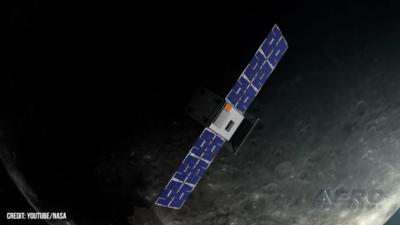CAPSTONE Will Arrive To Its Lunar Orbit On November 13, 2022
Rocket Lab USA reports that it has successfully deployed a satellite for NASA, setting it on a course to the Moon. The deployment marks the successful completion of Rocket Lab’s first deep space mission, paving the way for the Company’s upcoming interplanetary missions to Mars and Venus.

Owned and operated by Advanced Space on behalf of NASA, the Cislunar Autonomous Positioning System Technology Operations and Navigation Experiment (CAPSTONE) will be the first spacecraft to test the Near Rectilinear Halo Orbit (NRHO) around the Moon. This is the same orbit intended for NASA’s Gateway, a Moon-orbiting outpost that will provide essential support for long-term astronaut lunar missions as part of the Artemis program.
Rocket Lab’s role in the mission took place over two phases. First, CAPSTONE was successfully launched to low Earth orbit by Rocket Lab’s Electron launch vehicle on June 28th. From there, Rocket Lab’s Lunar Photon spacecraft provided in-space transportation, power, and communications to CAPSTONE. After six days of orbit-raising burns by Lunar Photon’s 3D printed HyperCurie engine, CAPSTONE was deployed on its ballistic lunar transfer trajectory to the Moon as planned at 07:18 UTC on July 4th. The mission was Rocket Lab’s fourth Electron launch this year, demonstrating the rocket’s continued reliability. In addition to providing the launch, Rocket Lab designed, manufactured, and operated the Lunar Photon spacecraft, successfully completing a highly complex deep space mission and demonstrating Rocket Lab’s growing capabilities as an end-to-end space company.
“The CAPSTONE mission marks the beginning of humanity’s return to the Moon through NASA’s Artemis program and we’re incredibly proud that Rocket Lab has played a key role in that,” said Rocket Lab founder and CEO, Peter Beck. “The Rocket Lab team has been working on CAPSTONE with NASA and our mission partners for more than two years, developing new small satellite technology in the form of the Lunar Photon spacecraft to make this mission possible, so it’s an incredible feeling after all that hard work and innovation to achieve mission success and set CAPSTONE on a course for the Moon.

This has been Rocket Lab’s most complex mission to date and our team has been incredible. We pushed Electron and Photon to their limits and proved it’s possible to do big missions with small spacecraft. Now we’ll be applying this ground-breaking technology for more interplanetary journeys, including our upcoming missions to Venus and Mars.”
With Rocket Lab’s role in the mission now complete, CAPSTONE’s solo journey to the Moon has begun. CAPSTONE will use its own propulsion and the Sun’s gravity to navigate the rest of the way to the Moon, a four-month journey that will have CAPSTONE arriving to its lunar orbit on November 13, 2022. The gravity-driven track will dramatically reduce the amount of fuel the CubeSat needs to get to the Moon. Advanced Space and Terran Orbital will manage the operation of the CAPSTONE satellite for the duration of its orbital lifespan.
 ANN's Daily Aero-Term (04.28.24): Airport Marking Aids
ANN's Daily Aero-Term (04.28.24): Airport Marking Aids Aero-News: Quote of the Day (04.28.24)
Aero-News: Quote of the Day (04.28.24) ANN's Daily Aero-Linx (04.28.24)
ANN's Daily Aero-Linx (04.28.24) Aero-News: Quote of the Day (04.29.24)
Aero-News: Quote of the Day (04.29.24) ANN's Daily Aero-Linx (04.29.24)
ANN's Daily Aero-Linx (04.29.24)




